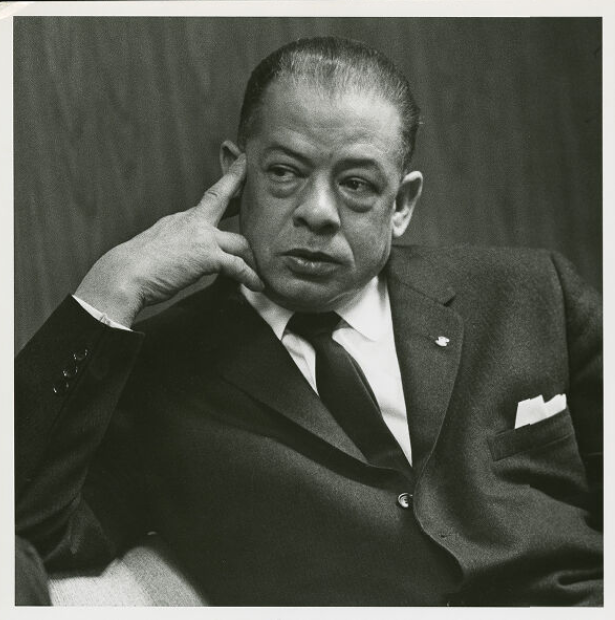1 Jan. 1908–6 Jul. 1978

John Harvey Wheeler, Black businessman and civil rights leader, was born in Kittrell on the campus of Kittrell College, an African Methodist Episcopal church school of which his father was president. His mother was Margaret Hervey Wheeler. The elder Wheeler (John Leonidas, 1869–1957), a graduate of Wilberforce University and the University of Chicago, gave up his academic career in 1908 for an executive position with the North Carolina Mutual Life Insurance Company in Durham. As the firm expanded throughout the South to become America's largest Black business, he was transferred to Atlanta to direct the Georgia district. There John H. Wheeler spent his early years, attending the Atlanta public schools and graduating summa cum laude from Morehouse College in 1929.
In the same year he left Atlanta for Durham, where he went to work for the Mechanics and Farmers Bank, a sister institution to North Carolina Mutual. Under the tutelage of Richard L. McDougald, bank president and community activist, Wheeler adopted a model of Black social and political activism. In 1952 he assumed the presidency of Mechanics and Farmers Bank. For Wheeler, as for McDougald before him, the bank served as a base for action that ranged well beyond providing financial services. Even in the day-to-day granting of loans to Black citizens, Mechanics and Farmers was more than a bank. Under Wheeler's direction it became an instrument for social change, making possible the purchase of decent homes, the acquisition of federal loans for housing projects, and the relaxation of discriminatory racial barriers among white banks that emulated Wheeler's borrowing practices.
Wheeler desired more change than economic uplift and indirect means. Black activists in Durham offered support and inspiration for direct politics. In 1935 he joined others to found the Durham Committee on Negro Affairs, a Black political organization that became one of the South's most effective local movements in the struggle for re-enfranchisement, civil rights, and economic justice. Wheeler served his apprenticeship in the DCNA. While there, he developed an acumen for New South politics. He presided over the committee from 1957 until his death. He chose to work behind the scenes as a political and social activist. His choice of political style may have been limited, however, because he typically stood ahead of the times and was judged as too radical for the DCNA to put forward as a candidate for public office.
His reputation for "radicalism" stemmed from his efforts to build a local coalition of Black and white workers, from his battle to integrate The University of North Carolina and the Durham public schools, from his continued endorsement of the sit-in movement, and, overall, from his lifelong demands for full equality. Wheeler earned his law degree from North Carolina College in 1947. Wheeler was important in the racial politics of the New South, especially in the years before 1964. During this period, figures like Wheeler were able to create important connections between differing ideologies of the pre-Civil Rights movement.
Wheeler gained more public recognition in the 1960s. In 1961 President John F. Kennedy appointed him to the President's Committee on Equal Employment Opportunity; in 1968 President Lyndon B. Johnson assigned him to the National Housing Corporation, a body created by the Housing and Urban Development Act of 1968. Meanwhile, the federal government had commissioned him to tour West Germany as part of a team evaluating the long-term effects of the Marshall Plan. In 1966 the State Department sent him to Egypt and Syria as a consultant and lecturer. His relationship with President Johnson earned him an invitation to participate in the drafting of the civil rights legislation of the 1960s. During the period 1963–68 he also served as president of the Southern Regional Council.
National recognition helped Wheeler perception in North Carolina as well. In 1964 he became North Carolina's first Black delegate to the National Convention of the Democratic party; he continued his formal role in the state party and eventually served as its financial director. In 1970 Duke University awarded him an honorary doctor of humanities degree.
In his personal life, Wheeler was an active tennis player and an accomplished violinist. His friends and colleagues remembered him as a renaissance man and a few months after his death established the John H. Wheeler Foundation, with the first Wheeler Scholarship awarded in 1979. He married Selena Warren, and they had two children, Warren Hervey and Julia. Wheeler was a life member of the NAACP and a member and trustee of St. Joseph's AME Church in Durham; he belonged to Omega Psi Phi fraternity and was a Mason and a Shriner. He was buried in Beechwood Cemetery, Durham.